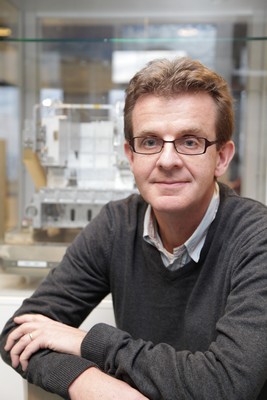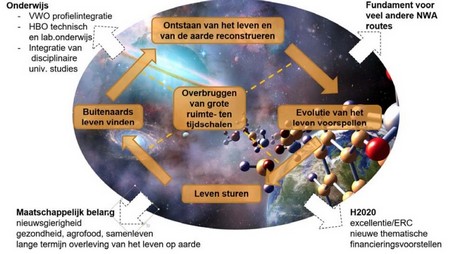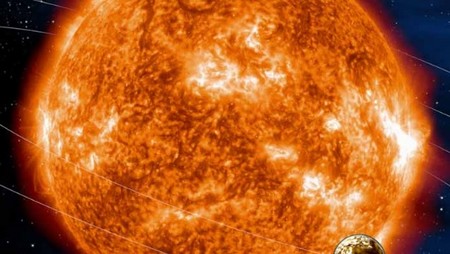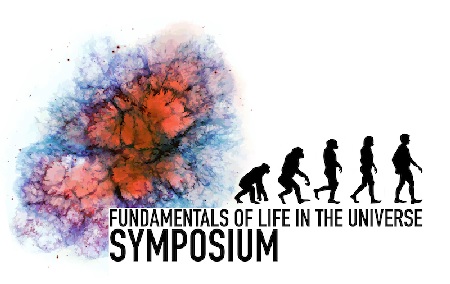New research centre on the origins of life, the universe and everything
When the Dutch public was asked to suggest topics for scientists to investigate, many people wanted to know more about the origins of life on Earth and in the universe, and how life has evolved over time. Their questions have been grouped together to form a research track in the National Science Agenda. Astrochemist Frank Helmich, who works at the Netherlands Institute for Space Research (SRON) and the University of Groningen’s Kapteyn Institute, is manager of this track. ‘A lot of new connections are being made.’

‘How did life on Earth begin, and how does evolution work?’ ‘Can we build a synthetic cell?’ ‘Is there life on other planets?’ ‘What is the origin, history and future of the universe?’ These are just some of the big questions that were submitted to the National Science Agenda, a project that began in late 2015 to find out what the Dutch general public wanted to know.
Connections
The idea is that the questions, over 11,000 in total, will inspire new research programmes, and that the government will provide extra funding. The questions have therefore been grouped into some 25 ‘Research tracks’. Track 4 is ‘The Origins of Life – on Earth and in the Universe’. It will tackle the above questions and more, including the one on what God has to do with it all.
Frank Helmich was involved in defining the research track. ‘There were workshops, and a document was produced and presented to the government in September 2016. But then things came to a standstill.’ No one knew exactly how to proceed, so a group of scientists involved in Track 4 called more meetings. ‘We wanted to continue with this ‘ Origins Centre ’, as we call it.’
It will be a virtual centre to promote collaboration between Dutch scientists. ‘A lot of new connections are being made. For example, I met some interesting scientists from Life Sciences here in Groningen, such as ecology professor Han Olff and theoretical biologist Franjo Weissing.’ Helmich, who was involved in several big astronomy projects, including the infrared space telescope Herschel, didn’t know many biologists, but his background in astrochemistry and exoplanets means they have shared interests.

This is the benefit of the Origins Centre, says Helmich: ‘All these people with different backgrounds are brought together more or less by accident. It creates a new environment and new possibilities.’ He already saw this during the two workshops to get the Centre started. ‘There were a lot of professors, who could have been using that time for research, teaching or writing grant applications.’ Helmich warned them that it was by no means certain that there would be a substantial research budget. He recalls one person saying: ‘Even if I don’t get any funding out of this, I want to keep in touch with the people I’ve met here.’
Pay-off
The questions from the National Science Agenda translate into challenging science questions. ‘Most of them are far beyond our current knowledge and abilities. It will take many steps to get there, but each step will have scientific value in its own right.’ This is a bit like space research, which is very familiar to Helmich. When future satellites are planned, they are designed with capabilities beyond the current level. Getting there is a big part of the scientific pay-off.

Meanwhile, University of Groningen scientists involved in Track 4 meet regularly for science colloquia. ‘I recently heard a talk by physics professor George Palastantzas, who is working on surface interactions and nanostructures. He said he needed an infra-red detector. I have worked on this type of detector for a long time, and discovered that I might be able to help a colleague from a totally different field.’
Helmich will manage Track 4 until the summer. ‘Part of my job is to work on a governance structure. My experience in many large-scale astronomy projects is very helpful.’ A new manager is currently being recruited. Helmich expects funds to become available soon, through a dedicated NWO call. ‘Some start-up funds have been reserved, which could amount to a little over EUR two million for our track.’ It may sound like a lot, but for a consortium that currently has some 35 to 40 actively involved scientists and a potential membership of 700 it is peanuts. ‘The idea is that in time, the government will provide extra funding for the National Science Agenda, and this should attract other funds as well. But the enthusiasm of those involved is already most rewarding and stimulating.’
This is the first part of a series on University of Groningen research into the origin of life and the Universe.
Red the next installments:
Part 2:
Evolving molecules point to principles of life
Part 3:
Synthetic biology: building life
Part 4:
The mystery of life’s broken symmetry
Part 5:
Life amongst the stars
Part 6:
Origins on a computer

About Track 4
The steering committee of Track 4 has seven members , three of whom are from the University of Groningen. They are Frank Helmich, biochemist Matthias Heinemann and organic chemist Sijbren Otto. Last year’s Nobel laureate in Chemistry Ben Feringa is the ‘figurehead’ of the programme.
A two-day symposium ‘ Fundamentals of Life in the Univers e ’ will be held in Groningen on 31 August/1 September.
| Last modified: | 20 July 2023 1.29 p.m. |
More news
-
21 November 2024
Dutch Research Agenda funding for research to improve climate policy
Michele Cucuzzella and Ming Cao are partners in the research programme ‘Behavioural Insights for Climate Policy’
-
13 November 2024
Can we live on our planet without destroying it?
How much land, water, and other resources does our lifestyle require? And how can we adapt this lifestyle to stay within the limits of what the Earth can give?
-
13 November 2024
Emergentie-onderzoek in de kosmologie ontvangt NWA-ORC-subsidie
Emergentie in de kosmologie - Het doel van het onderzoek is oa te begrijpen hoe ruimte, tijd, zwaartekracht en het universum uit bijna niets lijken te ontstaan. Meer informatie hierover in het nieuwsbericht.

